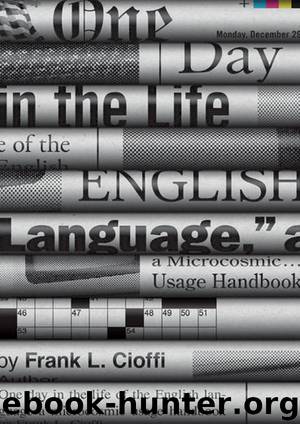One Day in the Life of the English Language: A Microcosmic Usage Handbook by Frank L. Cioffi

Author:Frank L. Cioffi [Cioffi, Frank L.]
Language: eng
Format: epub, azw3
Publisher: Princeton University Press
Published: 2015-03-01T06:00:00+00:00
Chapter 4
Punctuation, Part I—The Comma: Promiscuous Uses
Introduction: Punctuation Substitutes for Oral Emphases, Facial Expressions, and Body Language
When people speak, they consciously and subconsciously use an arsenal of effects to get their points across. They might emphasize certain words, pronounce others slowly or in an animated way, pause, use hand and facial gestures, insert filler phrases such as you know or like. In fact, body language and facial expression—extralinguistic communicative actions—account for an enormous portion of communication, perhaps more than we realize. Psychologist Paul Ekman contends, for example, that the forty-three facial muscles convey the majority of a person’s emotional state and thus constitute a significant part of communication (Foreman).
When we write, though, we don’t have the power to emphasize words in special ways or to slowly and carefully pronounce some and glide over others. We don’t have hand gestures when we write, or the ability to smile or frown or give the side-eye. But we do have something that’s invisible in speech. We have punctuation.
In the last hundred years or so in the United States, English punctuation has become quite standardized. There are ranges of acceptable usage (for example, some writers tend to use a large but acceptable number of commas, while others prefer to give fewer cues as to how their sentences should be read. I’ve been accused of overusing semicolons and dashes. Who, me?). In general, punctuation aids readers in understanding what you as a writer mean. You don’t want to confuse your reader or force that reader back to reread, especially when the simple insertion of a comma might ease straightforward, relatively unambiguous communication. In fact, sometimes a sentence with a comma can mean one thing, yet without that comma can mean the exact opposite. In legal writing, millions of dollars can hinge on a comma, which makes that little mark potentially a keystroke of great value. Or as the T-shirt would have it,
“Let’s eat, Grandma.”
“Let’s eat Grandma.”
COMMAS SAVE LIVES
Some punctuation decisions are less a matter of choice than others. You should probably not, for example, join main clauses using just a comma: this error, a comma splice, which I rail against in at least four places here, violates the rules of standard English usage. It stigmatizes the writer and slows or confuses communication. (However, you may join two main clauses with just a comma plus a coordinating conjunction, or what I have termed an ABS OF NY word.) You should not use a semicolon to set off an appositive, or use a colon after an incomplete sentence.
Yet people do these things, and live to tell. Punctuational risks differ from risking one’s life. There are quite a few “rules” to learn, but, as I did in the parts-of-speech chapters, I will here separate out “fundamentals” from “fine tuning” and “deep focus.” While all are important, you ultimately need to decide what level of accuracy/formality your audience expects, and adjust your usage accordingly.
Download
One Day in the Life of the English Language: A Microcosmic Usage Handbook by Frank L. Cioffi.azw3
This site does not store any files on its server. We only index and link to content provided by other sites. Please contact the content providers to delete copyright contents if any and email us, we'll remove relevant links or contents immediately.
Asking the Right Questions: A Guide to Critical Thinking by M. Neil Browne & Stuart M. Keeley(5759)
Autoboyography by Christina Lauren(5228)
Eat That Frog! by Brian Tracy(4526)
Dialogue by Robert McKee(4389)
Sticky Fingers by Joe Hagan(4188)
Journeys Out of the Body by Robert Monroe(3615)
Annapurna by Maurice Herzog(3464)
Full Circle by Michael Palin(3443)
Schaum's Quick Guide to Writing Great Short Stories by Margaret Lucke(3374)
Elements of Style 2017 by Richard De A'Morelli(3341)
The Art of Dramatic Writing: Its Basis in the Creative Interpretation of Human Motives by Egri Lajos(3058)
Atlas Obscura by Joshua Foer(2953)
Why I Write by George Orwell(2945)
The Fight by Norman Mailer(2930)
The Diviners by Libba Bray(2927)
In Patagonia by Bruce Chatwin(2920)
The Mental Game of Writing: How to Overcome Obstacles, Stay Creative and Productive, and Free Your Mind for Success by James Scott Bell(2897)
Venice by Jan Morris(2568)
The Elements of Style by William Strunk and E. B. White(2470)
